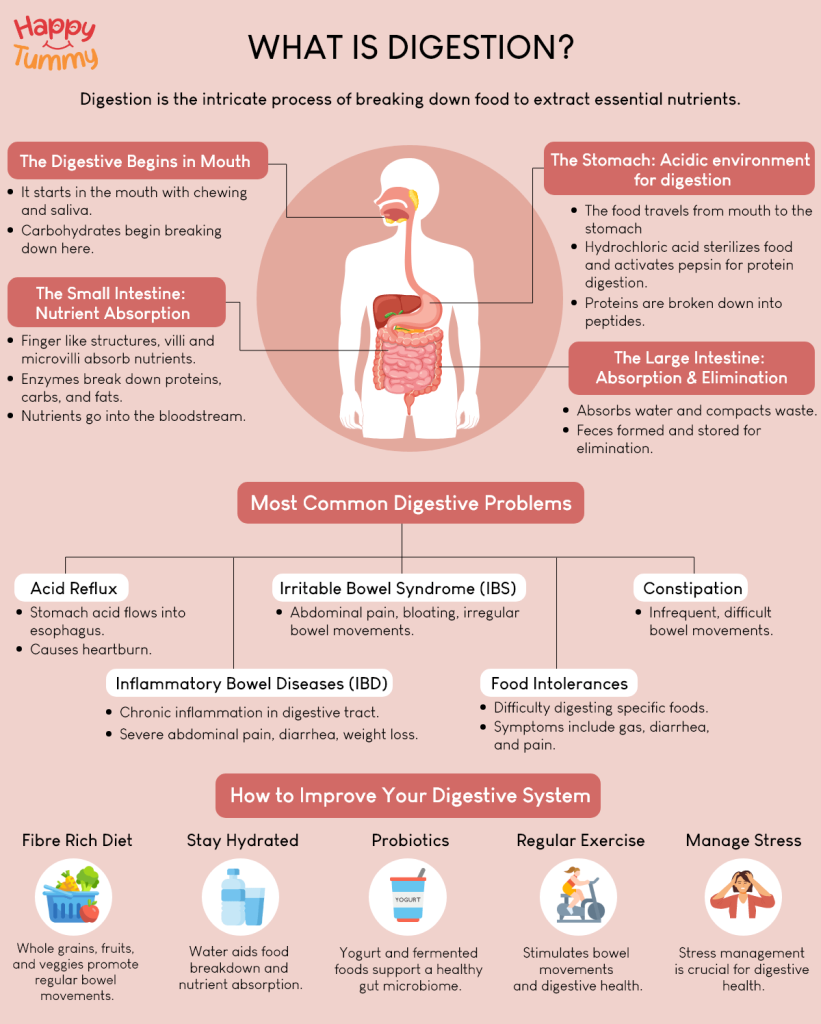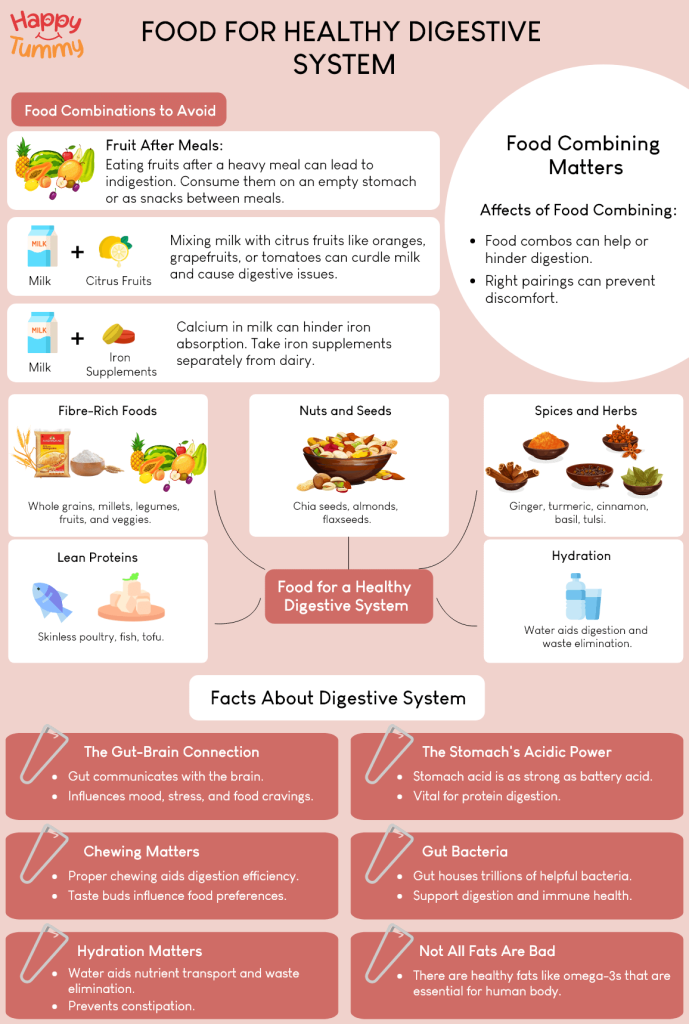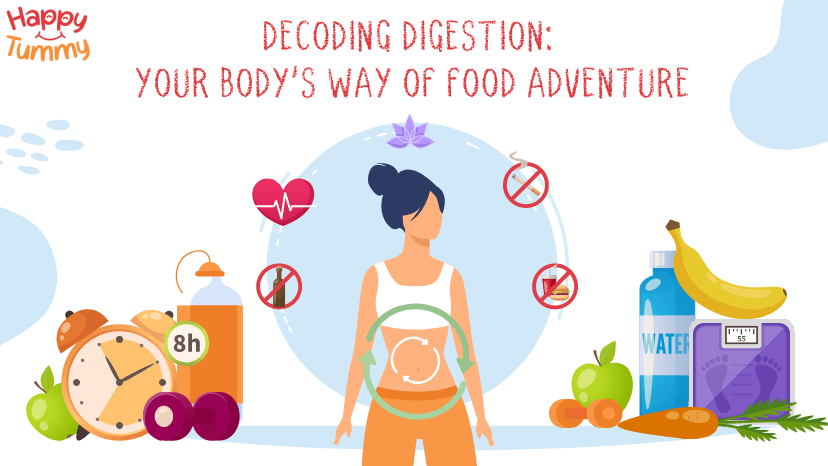Table of Contents
When you take that first bite of your favourite meal, a world of flavours dances on your taste buds. What happens next?
Well, it is nothing short of extraordinary what your body does to that food. Your body takes that food and converts it into various essential resources for different parts of your body.
It’s a process so intricate, so essential, that it fuels your every moment, from the simplest smile to the grandest adventure.
But wait. Have you ever wondered how your body transforms that mouthwatering burger, those crispy fries, or that hearty salad into the energy that keeps you going?
If your answer is no, you’re not alone.
What is digestion?

Digestion is like a machine process, working tirelessly, breaking down your food, and ensuring your body gets all the essential nutrients it needs to thrive.
So, if you’re curious about how your body turns food into fuel and want to know why digestion matters more than you might think, buckle up, because it’s going to be an enlightening adventure!
What is the Digestive System – The Digestive Process Unveiled
At its core, the digestive system is a complex network of organs and tissues working together to break down the food we consume. It all starts in the mouth, where chewing and saliva kick off the process by breaking down carbohydrates.
Then, the food travels down the esophagus and lands in the stomach, where stomach acids and enzymes take over, particularly targeting proteins.
Then, the small intestine, where nutrients get absorbed into the bloodstream. Here, carbohydrates, fats, proteins, vitamins, and minerals are all extracted and sent off to nourish our body cells. The large intestine follows, where water is absorbed, and any undigested food is compacted into waste.
Simple, right?
What’s intriguing is that this entire journey takes place seamlessly, without us even realizing it. Our bodies are masterful at this process, but sometimes things can go awry, leading to digestive issues like acid reflux or constipation. We’ll look at each step closely.
The Mouth – Where Digestion Begins
It all starts right in your mouth, the gateway to your digestive process. This is where the magic happens as you take that first delicious bite.
When you put food in your mouth, your teeth and tongue work together to break it down into smaller pieces. It’s all because of saliva. This watery substance isn’t just there to keep your mouth moist – it’s packed with enzymes that kick start digestion, especially carbohydrates.
As you chew, your saliva gets to work, breaking down starchy foods like bread and pasta into simpler sugars. This process is a vital step in turning the food you eat into energy your body can use.
So, chew slowly and savor your food to give your saliva the time it needs to do its job effectively.
Taste buds on your tongue help you distinguish between different flavours – sweet, salty, sour, and bitter.
This information is sent to your brain, which helps determine whether you find the food pleasing or not.
But the journey doesn’t stop here. Once your food is well-chewed and mixed with saliva, it forms a mushy mixture known as bolus. Your tongue then pushes this bolus to the back of your mouth, and with a swallow, it enters your esophagus (food-Pipe), continuing its journey through your digestive system.
The Stomach – Acidic Environment and Protein Digestion
Now we arrive at the stomach, a crucial stop on the food adventure. Your stomach is more than just a pouch; it’s an acidic powerhouse that plays a vital role in breaking down the food you eat.
The stomach is a reservoir of powerful acids and enzymes. When food reaches the stomach, it’s greeted with a blast of hydrochloric acid. This acid serves multiple purposes:
- It creates an acidic environment that sterilizes your food, killing harmful bacteria and viruses that might have hitched a ride.
- This acidic environment activates the enzyme pepsin, which specializes in the digestion of proteins.
Speaking of proteins, the stomach is where they get the VIP treatment. Proteins are complex molecules, and your stomach’s acidic embrace is essential for their transformation. Under the acidic influence, proteins unwind and start breaking apart into smaller, more manageable pieces called peptides. This is a crucial step because it prepares them for further digestion in the small intestine.
In simple terms, your stomach acts as a protein-digesting machine, thanks to its acid and enzymes..
The Small Intestine – Nutrient Absorption
The small intestine, despite its name, plays a critical role in your digestive system when it comes to nutrient absorption. Think of it as the Elite section of your digestive journey.
Once food leaves the stomach, it enters the small intestine, where the real nutrient extraction begins. This incredible organ has a massive surface area, due to tiny finger-like projections called villi and even smaller microvilli, all designed to maximise nutrient absorption. It’s like having millions of tiny workers dedicated to processing your food.
Here’s how it works:
- As food moves through the small intestine, various enzymes and digestive juices from the pancreas and liver join.
- They break down proteins, carbohydrates, and fats into their smallest components—amino acids, simple sugars, and fatty acids.
- These tiny nutrient molecules can then slip through the intestinal lining and into your bloodstream.
The small intestine doesn’t discriminate; it absorbs everything your body needs – vitamins, minerals, and those essential nutrients that keep you going. The nutrients are escorted into your bloodstream to be delivered to cells throughout your body, providing energy and nourishment.
The Large Intestine – Absorption and Waste Elimination
The final leg of our digestive journey, where the large intestine takes the spotlight. This crucial organ, also known as the colon, may not get as much attention as the stomach or small intestine, but it plays a pivotal role in the digestion process.
As food continues through your digestive system, it enters the large intestine in a mostly liquid state. Here, the large intestine’s primary job is to absorb water and electrolytes from this liquid, gradually transforming it into a more solid form. This absorption process ensures that your body retains the essential fluids while efficiently processing waste.
But the large intestine’s role doesn’t stop at hydration management. It’s also the final frontier for waste elimination.
Any undigested food particles, bacteria, and cellular debris that make it this far are compacted into feces. This waste material is then stored in the colon until it’s ready to be eliminated from your body.
Hope this was helpful for you to understand your digestive system.
In the next segment, we’ll explore some insights into the digestion process, shedding light on facts you may not have known.
Insights on the Digestion Process – Facts You Didn’t Know
1. The Gut-Brain Connection
Did you know that your gut and brain are in constant communication? This two-way street, known as the gut-brain axis, influences your mood, stress levels, and even food cravings. So, when you have a “gut feeling,” it might be more accurate than you think!
2. Digestion Takes Time
Ever wonder how long it takes for food to journey through your digestive system? It can vary, but on average, it takes about 24 to 72 hours for your body to process a meal completely. So, patience is key when it comes to digestion.
3. Gut Bacteria
Your Digestive Allies: Your gut is home to trillions of friendly bacteria that aid in digestion and support your immune system. These microbes help break down food, produce essential nutrients, and keep harmful invaders at bay. Maintaining a balanced gut microbiome is crucial for overall health.
4. The Stomach’s Acidic Power
The stomach’s acidic environment is incredibly potent, with a pH level comparable to battery acid. This acidity is essential for breaking down proteins and killing off harmful bacteria that may lurk in your food.
5. Chewing Matters
Digestion starts in your mouth, and chewing your food thoroughly matters more than you might think. Properly chewed food is easier for your stomach and intestines to handle, ensuring more efficient nutrient absorption.
6. Food’s Journey Through the Small Intestine
The small intestine, despite its name, is quite long, measuring around 20 feet in adults. This length provides ample surface area for nutrient absorption, allowing your body to extract the goodness from your meals.
7. Not All Fats Are Bad
While it’s true that excessive saturated and trans fats can be harmful, your body needs healthy fats like omega-3s for various functions, including maintaining a well-lubricated digestive system.
8. Hydration Matters
Staying hydrated is vital for digestion. Water helps dissolve and transport nutrients, aids in waste elimination, and keeps your digestive tract running smoothly. Dehydration can lead to constipation and other digestive issues.
9. Food Combining Matters
Certain food combinations can either aid or hinder digestion. For example, pairing protein-rich foods with fibrous vegetables can promote better digestion, while mixing incompatible foods may lead to discomfort.
Some common food combinations that you should avoid if you don’t want indigestion are:
Eating Fruit After a Meal: Eating fruits immediately after a heavy meal can cause indigestion for some people. It’s best to consume fruits on an empty stomach or as a snack in between meals.
Milk and Citrus Fruits: Mixing citrus fruits like oranges, grapefruits, or tomatoes with milk can curdle the milk and lead to digestive issues. This combination may not be suitable for some individuals.
Milk and Iron Supplements: Calcium in milk can inhibit the absorption of iron from supplements or iron-rich foods. If you need to take iron supplements, do so separately from consuming dairy products.
Food combinations that are good for your digestive system are:
- The classic dal-rice
- Palak and Paneer (cottage cheese)
- Biryani with raita
- Millet Idli with coconut chutney
- Grilled chicken with steamed broccoli.
- Grains and Vegetables
- Greek yogurt with berries and honey.
- Sliced apples with almond butter or cheese.
- Whole-grain pasta with lean ground turkey or chicken.
10. Stress and Digestion
Stress can wreak havoc on your digestive system. When you’re stressed, your body’s “fight or flight” response can slow down digestion, leading to issues like indigestion and heartburn. Finding ways to manage stress is crucial for digestive health.
Common Problems in the Digestive System
In the world of digestive health, it’s not always smooth sailing. Many of us encounter common problems that can disrupt our daily lives and well-being. Understanding these issues is the first step towards finding relief and maintaining a healthy digestive system.
Acid Reflux
- Stomach acid flows back into the esophagus
- Causes heartburn and discomfort
Irritable Bowel Syndrome (IBS)
- Abdominal pain
- Bloating
- Irregular bowel movements
Constipation
- Infrequent or difficult bowel movements
- Feeling backed up and uncomfortable
Food Intolerances (e.g., lactose intolerance, gluten sensitivity)
- Difficulty digesting specific foods
- Symptoms include gas, diarrhea, and stomach pain
Inflammatory Bowel Diseases (IBD) like Crohn’s disease and ulcerative colitis
- Chronic inflammation in the digestive tract
- Severe abdominal pain
- Diarrhea
- Weight loss
Luckily, there are steps you can take to manage these common digestive problems. Dietary adjustments, stress management, and lifestyle changes can often make a world of difference. Seeking guidance from a healthcare professional can provide valuable insights and personalized solutions to help you on your journey towards a happier, healthier digestive system.
How to Improve Your Digestive System?

Improving your digestive system is crucial for overall health and well-being. Here are some practical tips that anyone can follow to enhance their digestive health:
1. Fibre-Rich Diet
Incorporating fibre-rich foods such as whole grains, fruits, and vegetables into your diet can promote regular bowel movements and prevent constipation. Studies have shown that a high-fibre diet is associated with improved digestive function.
2. Stay Hydrated
Drinking an adequate amount of water is essential for digestion. Water helps in the breakdown of food and the absorption of nutrients, according to research.
3. Probiotics
Consuming foods rich in probiotics like yogurt and fermented foods can support a healthy gut microbiome. These beneficial bacteria have been linked to improved digestion and reduced gastrointestinal issues.
4. Regular Exercise
Experts suggest engaging in regular physical activity can help stimulate bowel movements and maintain a healthy digestive system.
5. Limit Processed Foods
High consumption of processed foods and sugary beverages has been linked to digestive problems. Reducing their intake can contribute to a healthier digestive tract.
6. Manage Stress
Chronic stress can negatively impact digestion. Practices like meditation, yoga, and deep breathing can help alleviate stress, leading to better digestive health.
Incorporating these habits into your daily routine can have a positive impact on your digestive system. However, it’s important to consult with a healthcare professional for personalized advice, especially if you have existing digestive issues.
Food that can help maintain a healthy digestive system
Fibre-Rich Foods:
Whole Grains: Include options like brown rice, quinoa, oats, and whole wheat bread.
Millets: Such as pearl millet (bajra) and foxtail millet, and other millets that are high in fibre.
Legumes and Pulses:
Beans, lentils, chickpeas, and other legumes are excellent sources of fibre and protein.
Fruits and Vegetables:
Berries: Blueberries, strawberries, and raspberries are rich in antioxidants and fibre.
Apples: Particularly with the skin, which contains soluble fibre.
Bananas: Known for their gentle effect on the stomach.
Leafy Greens: Spinach, kale, and other greens are packed with fibre and nutrients.
Avocado: Offers healthy fats and fibre.
Broccoli: High in fibre and beneficial for digestion.
Sweet Potatoes: Provide both fibre and important vitamins.
Greek Yogurt: High in probiotics, which support gut health.
Nuts and Seeds:
- Chia Seeds
- Almonds
- Flaxseeds
Spices and herbs
Ginger, Turmeric, cinnamon, basil, tulsi, etc.
Lean Proteins
Skinless poultry, fish, and tofu are easier to digest than fatty meats.
Water
Staying well-hydrated is crucial for maintaining healthy digestion.
Bottomline
In conclusion, grasping the intricacies of the digestion process can empower us to make healthier choices and nurture our bodies better. To keep this system in top shape, opt for digestion-friendly foods like millet, chia seeds, whole grains, fruits, and veggies. By understanding and respecting your body’s digestive journey, we embark on a path toward improved overall health and vitality.
FAQs
Digestion is essential for the body as it allows us to break down the food we eat into nutrients that can be absorbed and used by our cells for energy, growth, and repair. Without proper digestion, our bodies cannot obtain the essential nutrients, vitamins, and minerals needed for overall health and well-being.
Food digestion in the stomach involves a complex process. When you eat, your stomach produces gastric juices containing hydrochloric acid and digestive enzymes.
These substances help break down the food into smaller particles. The muscular walls of the stomach then churn and mix the food with these juices, forming a semi-liquid mixture. This mixture is gradually released into the small intestine, where further digestion and nutrient absorption take place.
Several tips can help speed up digestion:
• Chew your food thoroughly to help the digestive enzymes work effectively.
• Drinking enough water as it supports digestion and helps prevent constipation.
• Eat fibre-rich foods which help in regular bowel movements and keep the digestive system healthy.
• Eat smaller, well-balanced meals
• Exercise regularly
• Stress can slow digestion; relaxation techniques can help alleviate this.
Several factors can aid digestion:
• A diet rich in fibre can prevent constipation and support regular bowel movements.
• Adequate water intake
• Digestive enzymes, both those produced by your body and those found in certain foods or supplements, can help break down food.
• Eating slowly and savouring your food can improve digestion.
• Exercise can promote healthy digestion.
• Probiotics aka the “good” bacteria promote a healthy gut and aid in digestion.
Digestion times vary depending on the type of food and individual factors, but on average, it takes approximately 24 to 72 hours for food to move through the entire digestive system.
This includes time in the stomach, small intestine, and large intestine, and the transit of waste products before elimination.
Digestion can be influenced by various factors, including:
• Digestive disorders, such as irritable bowel syndrome (IBS) or celiac disease, can disrupt digestion.
• High-stress levels can affect digestion negatively.
• Hormonal changes, such as those during pregnancy, can influence digestion.
• Insufficient water intake can lead to constipation and slow digestion.
• Smoking and excessive alcohol consumption can hinder digestion.
• Some medications can affect digestive processes.
• The digestive function may change with age, often slowing down.
• The types of foods you eat and their fibre content can impact digestion.















